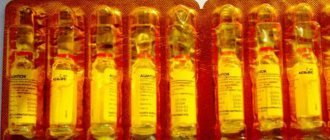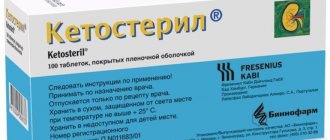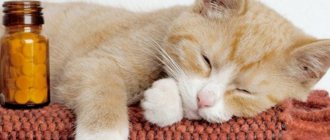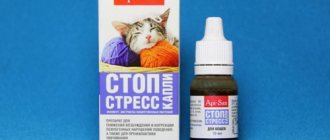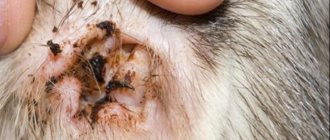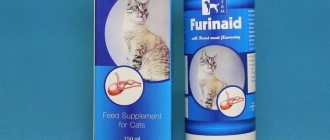COMPOUND
Active substance:
- Feliferon for cats, according to the instructions, 1 ml contains feline interferon with antiviral activity of 400,000 IU as an active ingredient
Excipients:
- dextran-40 50.00 mg
- sodium salt of ethylenediaminetetraacetic acid 0.07 mg
- sodium acetate 1.64 mg
- sodium chloride 5.84 mg
- polysorbate-20 0.10 mg
- glacial acetic acid about 0.0045 ml
- water for injection up to 1 ml
Release form and analogues
Interferon is produced in the form of a powder, scattered in ampoules of 2 ml. It is better to dilute this powder with special water for injection (sterile) up to the mark on the ampoule. But you can also use distilled or boiled water, which should be cooled. After dilution, you need to shake the ampoule so that the powder is completely dissolved.
The drug should be stored at a temperature of 4 to 10 degrees Celsius. The shelf life of Interferon is 2 years from the date of manufacture written on the packaging, which contains 10 ampoules.
Well-known analogues of Interferon are:
- "Amiksin".
- "Laferobion".
- "Viferon".
- "Nazoferon".
- "Feliferon".
PHARMACOLOGICAL PROPERTIES OF FELIFERON
Pharmacological group: immunomodulators, drugs with antiviral activity. Feliferon for cats has an immunostimulating and antiviral effect.
The mechanism of action consists of:
- increased phagocytic activity of macrophages in cats
- increasing the specific cytotoxicity of lymphocytes
- increasing the resistance of healthy cells of the cat’s body to infection with viruses
- in suppressing the reproduction of RNA and DNA viruses in infected cells
According to the degree of impact on the cat’s body, Feliferon is classified as a low-hazard substance
(grade 4), in recommended doses does not have a skin irritant or resorptive toxic effect.
Consumer Reviews
I have always been skeptical of domestic manufacturers. Cheap could not be high quality. Therefore, I was surprised when the veterinarian prescribed a course of Feliferon to restore the cat after giving birth. After the injections, she became interested in kittens, leaving the house and eating.
Anastasia
While relaxing at the dacha, the cat contracted an infectious disease. He was constantly vomiting and had diarrhea. I had to urgently return to the city and go to the vet. The doctor made a disappointing diagnosis and prescribed treatment. I believe that it was Feliferon that helped the animal recover.
Andrey
The cat suddenly caught a cold.
She didn't react to anything. The veterinarian prescribed treatment. Among the drugs was Feliferon. I was skeptical about the prescription, but completed the course. On the second day, the pet came to life and began to behave actively. He asked me to eat, drank water and responded to me. Elena
Why use Feliferon to treat cats?
According to the instructions, feliferon is designed for the treatment of viral diseases of cats. Field studies of cats with calicivirus infection have shown a reduction in the severity and duration of clinical signs associated with the virus. The drug has also been used in the adjunctive therapy of cats with infectious peritonitis with uncertain clinical results.
Feliferon for cats has been used experimentally in the treatment of feline viral infections, including leukemia, immunodeficiency and coronavirus infection.
Feline interferon given prophylactically or therapeutically to cats experimentally infected with FIP does not reduce mortality. However, the high-dose protocol resulted in transient suppression of clinical signs and decreased serum antibody titers to FIP with increased survival time (weeks) compared to untreated cats. There are no good studies on the effect of this treatment on spontaneously occurring FIP infection, although one protocol has been described using human interferon alpha 30 IU/day orally for 7 days on alternating weeks for 6–7 weeks.
Feliferon in cats is indicated for the treatment of herpes keratitis.
Trials are currently underway to examine the potential benefits of interferon therapy for feline chronic gingivostomatitis.
Side effects
When using Interferon, no side effects were identified in cats and female cats, as well as no contraindications . However, it is not recommended to use this medicine without consulting a veterinarian.
Thus, “Interferon” for cats and dogs becomes the best immunostimulating agent that allows you to confidently defeat any respiratory diseases. The drug activates the body's cells, helping to build a protective barrier against pathogenic bacteria and viruses.
Viral and infectious diseases of cats are treated with a complex of medications; immunomodulators are necessarily included in therapeutic regimens. One of the popular and effective drugs in this group is Feliferon injection solution, which suppresses the activity of viruses and accelerates recovery.
INDICATIONS
Feliferon is prescribed to cats according to the instructions for use for therapeutic and prophylactic purposes for:
- feline herpesvirus (rhinotracheitis)
- panleukopenia
- calicivirus
- anemia and hypovitaminosis
- in the postoperative period
- in the postpartum period
- secondary immunodeficiency
- gastrointestinal
- invasive diseases
- acute respiratory
- poisoning
- other diseases of viral or mixed etiology
How to use
Feliferon injections for cats, according to the instructions for use, are given intramuscularly. The dosage and regimen of use depends on the pathology and the degree of its development:
- If there is a threat of infection, injections are given to strengthen the immune system twice with an interval of 48 hours. A single dose is 200,000 IU or 0.5 ml per animal.
- If an immunostimulant is used in the treatment of bacterial, viral and other diseases, it is administered at a dose of 0.5 ml per day. The duration of treatment is usually 5-7 days. In this case, the drug is combined with antibiotics, antiviral drugs, as well as medications whose action is aimed at eliminating symptoms.
- If the disease is severe, the daily dose may be doubled, that is, up to 1 ml. The duration of treatment is about a week, but usually the course is determined by the doctor on an individual basis.
It is recommended to administer the drug at approximately the same time and at regular intervals. It is advisable not to miss the next dose of medication. If the injection was not given on time, you need to return to treatment as soon as possible. In this case, there is no need to make changes to the treatment regimen.
Note! It is prohibited to mix an immunomodulator with other medications in the same syringe.
MODE OF APPLICATION
Feliferon solution for injection is administered intramuscularly to cats. If there is a threat of infection, the drug is prescribed at a dose of 200,000 IU per animal, twice with an interval of 48 hours. For the treatment of cats with viral, bacterial and mixed diseases, Feliferon is administered in a daily dose of 200,000 IU, for 5-7 days in combination with antibiotics, serum and immunoglobulin preparations, in accordance with the instructions for their use.
In severe cases of the disease and mixed infections, it is recommended to increase the average therapeutic dose by 2 times - 400,000 IU.
No overdose symptoms have been identified when using the drug. Avoid missing the next dose of Feliferon in cats, as this may lead to a decrease in therapeutic effectiveness. If one dose is missed, it is necessary to administer it to the cat as soon as possible, then the interval between administrations of the drug does not change.
Contraindications and side effects
And although Feliferon is considered a safe drug for cats, it has contraindications. It can cause more harm than good to an animal’s body in the following cases:
- for autoimmune diseases;
- for allergic pathologies that occur in severe form;
- in case of intolerance to components.
The immunostimulant is generally well tolerated by pets and can be used on cats of all ages, including kittens. When using this medication on kittens or pregnant cats, consult your doctor. Even exceeding the dose usually does not have negative consequences for animals.
If you are intolerant to the substances included in the composition, an allergy may occur, which is manifested by a rash, vomiting, itching or other unpleasant symptoms. In this case, stop using Feliferon. To alleviate the suffering of the animal, it is given an antiallergenic drug and, if necessary, symptomatic treatment is prescribed.
Prevention measures:
If allergic reactions occur or if the drug accidentally enters the human body, you should immediately contact a medical facility (bring the instructions or label with you).
People with hypersensitivity to the components of the drug should avoid direct contact with the drug. When working with Feliferon for cats, you should follow the general rules of personal hygiene and safety precautions provided for when working with medications.
If a person accidentally comes into contact with the medicinal product with the skin or mucous membranes of the eyes, they must be rinsed with plenty of running water.
Empty drug bottles must not be used for household purposes; they must be disposed of with household waste.
Types of interferon administration in cats
As stated earlier, interferon comes in different forms. Interferon is most often administered in the form of subcutaneous injections. The injection is located under the skin and is the most direct way to administer the medication. It is especially used for cats who are suffering from IVF or felv. Injection is one of the quick-acting methods of administering interferon.
Oral interferon is often used in low dose prescriptions . It is usually liquid and should not be administered with a hypodermic syringe. Administration of oral interferon requires restraining the cat and opening the mouth to allow the medication to be administered. While oral interferon is used to strengthen the immune system, low doses of oral interferon are also used to treat dermatological problems in cats, such as:
- Idiopathic facial dermatitis
- Atopic dermatitis
- Indolent dermatitis
- Dermatitis caused by herpes virus infection.
One of the key differences in determining how interferon should be administered relates to the desired action. Oral interferon is typically used to strengthen the immune system. Interferon injections are typically used as an antiviral even if the presence of the virus in the system is not reduced. This is similar to the various treatments for HIV/AIDS in humans.
Interferon for cats is also given as eye drops . It is used more often and almost exclusively to treat the symptoms of feline herpes virus. Thus, administering interferon to a cat may be difficult, so you may need help holding the cat in place. As with any drug given to your cat, you should watch for side effects or adverse reactions. Side effects may include:
- Seasickness
- Nausea
- Headache
- Muscle pain
- Malaise
- Fatigue
- Diarrhea
- Vomit
- Anorexia
- Labored breathing
The extent of side effects will depend on the dose and the individual cat. Interferon is available in liquid form for oral use, injection, or eye drops. This should be kept refrigerated and should not be shaken.
Learn about essential antimicrobials in animals
- Trichopolum instructions for veterinary medicine
- Instructions for the use of the antibiotic Baytril in animals
- Instructions for use of metronide
- Instructions for ceftriaxone preparations for animals
- Use of Metrogyl in veterinary medicine
- Instructions for doxycycline in animals
- Metronidazole (Metronidazole) for animals (instructions for use in veterinary medicine, doses, indications and contraindications)
- Atovaquone (ATOVAQUONE)
- Azithromycin, instructions for animal therapy
^Top
Features of use
The drug is prescribed for the prevention of viral diseases, especially during an epidemic. It is useful in the postpartum period, since the cat’s body is weakened. After surgery, there is a risk of complications, the medicine helps reduce the likelihood of their occurrence.
The instructions for use of Feliferon for cats include the following indications for use:
- hypovitaminosis;
- anemia;
- poisoning;
- diseases of the digestive system;
- helminthiases.
You cannot administer the medicine immediately after vaccination, as it will suppress the effect of the vaccine and prevent the formation of immunity against a specific disease. You must wait ten days and only then use the drug.
Injections are given intramuscularly, dosages are calculated individually. To increase immunity, injections are given twice (once a day), a single dose of 0.5 ml per cat. The same amount of the drug is administered to treat diseases, the average course is 5 days. Feliferon is combined with antibiotics and other medications. In case of severe pathologies, the dose is increased to 1 ml per day, the duration of treatment is about a week.
It is advisable to give injections at the same time, at regular intervals. Do not skip the administration of the drug. Feliferon is not mixed with anything in the syringe. You should not skip the course of treatment, as this reduces the effectiveness of the medicine.
Cost of interferon for cats
As with any cat treatment, the veterinarian should prescribe interferon. If we want to know where to buy interferon for cats, that means you must get a prescription from a veterinarian. In general, veterinarians who request this product will only provide it to caregivers.
There is no fixed price for interferon for cats. Your cost will depend on where you live, the dose required, the type of administration, and other factors such as the cat's weight. However, it can be said that in general these are quite expensive drugs . This can make it a barrier for some cat guardians, as veterinary bills can pile up. As a palliative, individual circumstances should be discussed with a veterinarian...
This article is purely informational. HowMeow.ru does not have the right to prescribe veterinary treatment or diagnose. We invite you to take your pet to the vet if you are suffering from any illness or pain.
Instructions for use of Feliferon
Veterinarians prefer to prescribe the drug we describe in the following cases:
- For acute or chronic diseases of the gastrointestinal tract.
- Feline interferon is very useful for respiratory infections of a viral or bacterial nature (in the latter case, to prevent the accumulation of viral diseases).
- It is recommended to use Feliferon in case of other bacterial, fungal or viral pathologies, since the drug effectively increases the cat’s immunity and helps the animal quickly cope with the consequences of the disease.
- It is useful for hypovitaminosis and even anemia, as it strengthens the defense mechanisms of the pet’s body.
- The instructions for use recommend its use in case of serious poisoning.
- The drug has proven itself very well when used in the postpartum period as a means of reliably preventing the development of secondary infections (especially after difficult, protracted labor).
- Similarly - in the postoperative period. Experts say that the introduction of prophylactic doses of the drug reduces the likelihood of developing postoperative complications by approximately 40%. This is especially true for “dirty” operations associated with the need to operate on inflamed, purulent wounds and other injuries.
- Secondary immunodeficiencies are also treated with feline interferon.
Important! It is strongly not recommended to prescribe and use this drug within ten days from the date of any vaccination, since otherwise the effect of the vaccination may be significantly reduced or may not appear at all. However, this applies equally to all drugs that have an immunomodulatory effect.
Is Feliferon administered to pregnant cats?
Veterinarians are divided on this issue. But many experts still believe that doing this is risky. There is an opinion that the introduction of any immunomodulators to pregnant cats during pregnancy is fraught with the development of autoimmune pathologies and other disorders associated with the animal’s immune system.
Thus, using the medicine in such cases is an extreme measure due to the impossibility or undesirability of using other medications.
How and where to inject the medicine
So how and where to inject the drug? It is administered only intramuscularly. There are no special subtleties or nuances: it is only important to carefully cut and wipe the area where the drug is injected with a 70% alcohol solution. After the injection, it is useful to massage and rub this area a little in order to better distribute the medicine in the tissues of the animal.
Feliferon dosage
The dosage depends on the goals pursued by the drug:
- For preventive purposes, when the owner suspects that his pet has been in contact or may come into contact with sick individuals in the future, the medicine is used in a dose of 200,000 IU (i.e. 0.5 ml). It is administered twice, the interval between applications is two days.
- When treating viral or other diseases, the dose is the same, i.e. 200,000 IU, but injections are given every day. The treatment period is exactly a week. The combined use of the drug with antibiotics and other antimicrobial agents, immunoglobulins and serums is allowed, but before this, consultation with an experienced veterinarian is necessary.
- If the disease is severe and the animal’s condition is in doubt, then a milliliter of the drug (400,000 IU) is administered at a time. The treatment period can be increased to two weeks.
The drug must be used in accordance with the timing and dosage of administration. Even a single omission of administration of the drug is fraught with a serious decrease in its therapeutic effect. In such cases, it is necessary to repeat the administration of the drug as soon as possible, trying to keep the interval between doses as short as possible. Some experts in such situations recommend increasing the dose by about 50,000 IU.
Contraindications when using Feliferon
The only significant factor limiting the widespread use of the drug is the individual intolerance of the animal to its components. However, there are other contraindications. In addition, we have already indicated above that it is not recommended to use it until ten days have passed from the date of any vaccination.
Finally, experienced veterinarians believe that it is extremely undesirable to prescribe Feliferon in the following cases:
- The animal's predisposition to various allergic reactions.
- In the long term, it is dangerous to prescribe feline interferon for autoimmune diseases of any origin (the drug can worsen the animal’s condition).
If, after administration of the drug, the animal experiences symptoms of an allergic reaction, the use of the drug should be stopped immediately and the cat should be given symptomatic therapy in the form of antihistamines.
Side effects of Feliferon
The manufacturer and experienced specialists say that no side effects have been identified during the entire period of use of the drug. The same statement is true even in case of severe overdose.
